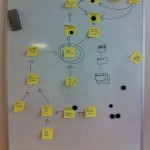 I like all activities in Retr-O-Mat. Of course, I do, otherwise I would not have invested the time to add them. Still, when I selected activities for the Print Edition I realized that some activities HAD to be in it and others were interchangeable.
I like all activities in Retr-O-Mat. Of course, I do, otherwise I would not have invested the time to add them. Still, when I selected activities for the Print Edition I realized that some activities HAD to be in it and others were interchangeable.
Which are these key activities, you ask? Well, here they are:
For Teams
Teams new to agile need to learn what to improve, what they can influence and how best to implement change:
- Circle of influence
The team will be most successful if they tackle problems they can influence instead of bitching about things they cannot change - SMART Goals
A concrete, measurable goal / action item has a much higher chance of being implemented than a nebulous one, that no one knows how to act on - Low hanging fruit
Start with small steps. Early successes can start a virtuous cycle - Undercover Boss
Changing perspective: The team’s perspective is not the only one there is. Other views are just as valid.
For Facilitators
If you’re new to facilitating retrospectives, here are methods and ideas I keep coming back to:
- Lean Coffee
Lean Coffee is the new black: It goes with everything. It’s my goto-method to facilitate all kinds of unstructured discussions. I even made it the crowning 24th 1-pager in the Wall-Skills advent calendar. - SaMoLo
Gather suggestions in the categories “Same of”, “More of” and “Less of”. Can also cover a range of situations, e.g. to give feedback to new new colleagues - Cause-Effect-Diagram
Such a powerful method: I’ve seen it break nasty loops so that teams finally find one end of the problem chain to yank on. IMO more suited for real-life complex problems than 5 Whys. - Merge
Having many action items lowers the chances of any improvement getting implemented. Boiling it down to very few important ones is key and “Merge” does that nicely. - Brainwriting
Written activities are the remedy for teams with silent members - Physical activities such as Take a Stand or Constellation
Moving raises energy levels and influences how we feel about issues - Appreciative Inquiry
It doesn’t have to be about problems all the time. You can also concentrate on positive things and still find great improvements. (Diana Larsen has created a retrospective plan with appreciative activities only.) - Speedboat
Very simple yet it always draws out good contributions. I love the metaphor
As a facilitator starting with a new team, you might want to test the waters with:
- ESVP
How do people feel about having retrospectives?
Personal favorites
Out of the above my personal favourites are Lean Coffee and Speedboat. I just love those!
Which activities do you prefer?
